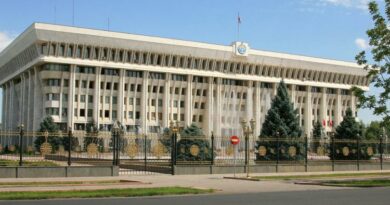In Kyrgyzstan, people are concerned about the arrests of women
In the past few weeks, three women have been detained and taken into custody in Kyrgyzstan. They are Yulia B., who was in the car, the driver of which is suspected of bribing votes, Ksenia Barabash, who was arrested in the case of illegally granting benefits to the Turkish company at Manas airport, and Gulzat Aalieva, in respect of whom pre-trial proceedings were initiated under the article “Incitement of racial, ethnic, national, religious or interregional hostility”.
This situation worried some human rights defenders and deputies in Kyrgyzstan. They believe that a milder measure of restraint could have been applied to the detainees.
In connection with these arrests, the deputy of the Parliament Natalya Nikitenko posted a statement on her Facebook page, in which she expressed outrage at the fact that while women are being left in the pre-trial detention center during the investigation, “corrupt officials, whose names have become household to denote corruption, are released under house arrest, subscription or altogether released after dubious payments of damage. By the way, it isn’t known how this damage was determined”.
The elected representative of the people noted that she didn’t know personally the detainees, but she didn’t accept any attempts to “violate interethnic and interfaith harmony and peace in the country”. She is also a strong opponent of any corruption.
“Why are women placed in a pre-trial detention center? And for any other reason, our authorities ask to give the facts. One civil servant makes poison in front of everyone and makes people use it. And he continues to lead the ministry… just as if nothing had happened,” Nikitenko wrote.
She called the situation “double standards” and expressed the opinion that preventive measures should be consistent with the alleged crime, take into account the suspect’s ability to leave the country or avoid punishment, “and not be applied for political, personal or other reasons, and not on the basis of “if you can pay, you will be released; if you cannot, you will be in jail”.
Timur Shaikhutdinov, coordinator of the civil union “For reforms and results”, also commented on the situation with the arrest of three women. He noted that the cruelty of the investigation and the courts, which have chosen such a measure of restraint for the detainees, is evident.
“They are not criminals. They don’t represent a public danger and didn’t intend to run away. Why was it impossible to choose another measure of restraint, not related to arrest? In a normal situation, it would be possible to demand from the Prosecutor’s Office to give a legal assessment of all these actions, including the statement of Yulia B. about the use of violence against her. So far, one cannot count on the objectivity of the law enforcement and judicial systems. And all this is happening against the background of the pseudo-humanism of the security forces and the courts in relation to suspects in corruption,” the human rights activist emphasized.
He believes that this is an alarming trend, and the level of public confidence in the law enforcement and judicial systems of the country, which is already low, is falling even lower.
Employees of the National Center for the Prevention of Torture conducted a special visit to the Internal Affairs Directorate of Pervomaisky district of Bishkek to talk with one of the detainees, Gulzat Aalieva. The woman didn’t complain about torture and inhuman treatment.
Nevertheless, following this visit, the National Center for the Prevention of Torture issued a statement that there is no need to detain persons accused of committing such crimes (Aalieva is accused of inciting interreligious strife).
“Pursuant to rule 57 of the United Nations Rules for the treatment of women prisoners and non-custodial measures for women offenders (the Bangkok Rules), the development and implementation of appropriate measures for women offenders are governed by the Tokyo Rules. Member states’ legal systems are developing gender-responsive options for substituting penalties of imprisonment for other forms of correction, and alternatives to pre-trial detention and court-ordered punishment, taking into account the history of the victimization of many women offenders and their care responsibilities,” was said in the statement.
In addition, the staff of the National Center for the Prevention of Torture recalled that the detention is a threat in the current COVID-19 epidemic, and that the UN Subcommittee on Prevention of Torture and Other Cruel, Inhuman or Degrading Treatment or Punishment has adopted a number of recommendations to member states of the relevant Convention, including Kyrgyzstan, where it’s recommended to reduce the number of prisoners and other detainees by early, preliminary or temporary release of those prisoners for whom this measure is safe.




